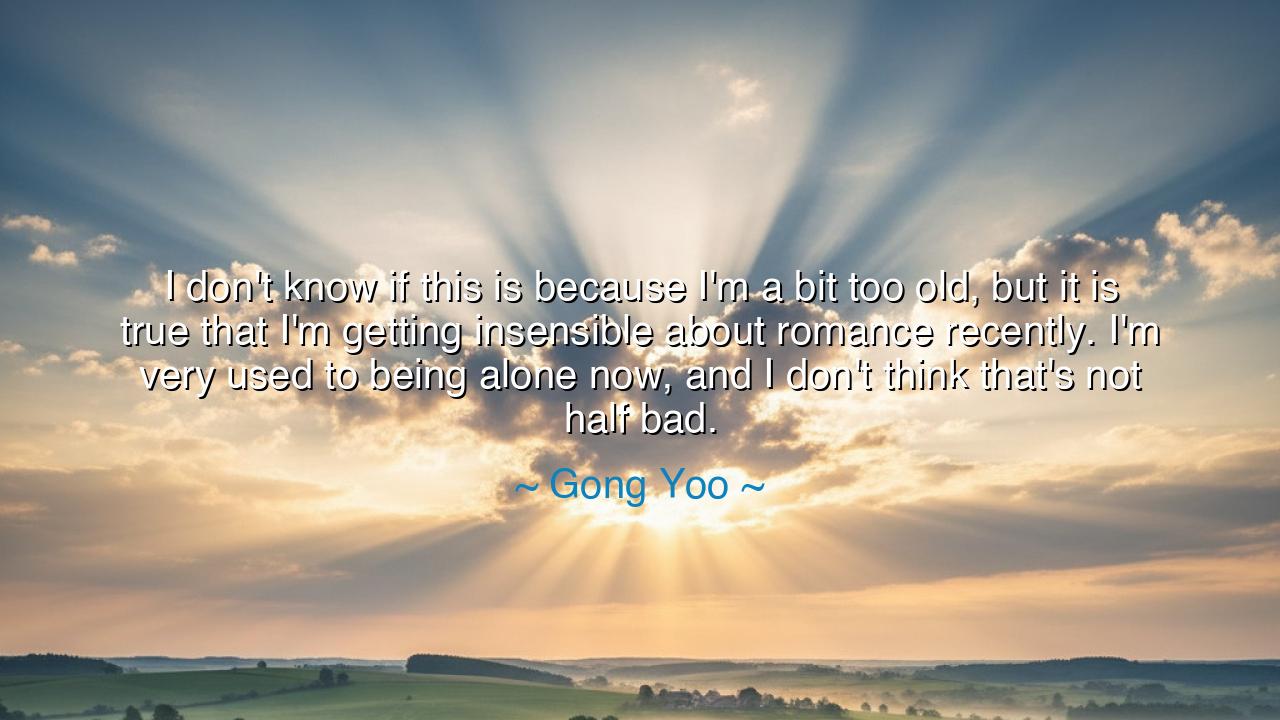
I don't know if this is because I'm a bit too old, but it is true
I don't know if this is because I'm a bit too old, but it is true that I'm getting insensible about romance recently. I'm very used to being alone now, and I don't think that's not half bad.






“I don’t know if this is because I’m a bit too old, but it is true that I’m getting insensible about romance recently. I’m very used to being alone now, and I don’t think that’s not half bad.” — Gong Yoo
In these quiet, reflective words, Gong Yoo, a man known for his depth and grace both on screen and off, gives voice to a truth that visits all souls who have walked far enough along the road of life: that solitude, once feared, can become a companion, and that romance, once burning like fire, may fade into a gentle ember. His confession is not one of despair but of peace — a recognition that there are seasons in the heart, and that to be alone is not always to be lonely. For as youth rushes to seek love outside itself, age learns to find it within.
The origin of this reflection lies in Gong Yoo’s own passage through time — a journey marked by fame, success, and the silent cost of both. As an actor, he has lived many lives in a single lifetime, embodying heroes, lovers, and dreamers. Yet beneath the applause, there remains the man himself: one who has known the price of visibility and the quiet hunger for stillness. His words, spoken with humility, carry the weight of experience — the realization that love, while beautiful, is not the only path to fulfillment. To be at peace with one’s solitude is a victory greater than any romance could bestow.
This sentiment echoes the wisdom of the ancients, who understood that the soul must sometimes withdraw from the world to find its center again. Marcus Aurelius, the Roman emperor-philosopher, once wrote, “Nowhere can man find a quieter or more untroubled retreat than in his own soul.” Gong Yoo’s words breathe the same philosophy. What he calls “being used to being alone” is not numbness, but awakening — the discovery of contentment beyond desire. He does not mourn the loss of passion; he honors the peace that follows its storm.
There is, too, a tenderness in his statement — a soft resistance against the world’s expectation that love must define a life. Society often measures happiness by companionship, yet Gong Yoo reminds us that wholeness can exist in solitude. The heart, when no longer chasing romance, turns inward and rediscovers itself. In that stillness, one begins to see beauty not as something to possess, but as something to contemplate. Just as the moon does not need the sun’s warmth to shine, so the human spirit, once mature, can glow quietly on its own.
Consider the life of Henry David Thoreau, who withdrew to the woods of Walden Pond to live alone and write. Many thought him strange or melancholic, yet in solitude, he found freedom. “I love to be alone,” he wrote. “I never found the companion that was so companionable as solitude.” Like Gong Yoo, Thoreau discovered that silence is not emptiness, but fullness — a state where the heart is no longer restless, but complete. Their wisdom is the same, though centuries apart: to be alone is not a curse, but an art.
And yet, Gong Yoo’s words carry a quiet ache — not of bitterness, but of nostalgia. He speaks as one who has loved and lived deeply, and now stands in the twilight between yearning and acceptance. “I don’t think that’s not half bad,” he says, a phrase of humility, as if to comfort the listener: do not fear this stage of life. In truth, it is a gentler kind of happiness, one born not of excitement but of equilibrium. The heart no longer trembles, yet it still beats with meaning — steady, self-contained, serene.
So, O listener, learn from the calm honesty of this man’s reflection. Do not mistake the quiet life for an empty one. The world teaches you to chase love, but it rarely teaches you to cherish solitude. Seek companionship, yes, but also seek the ability to sit alone without sorrow. When you reach that place where your own company feels enough, you will have found a freedom that few ever know.
For as Gong Yoo reminds us, to be alone is not to be loveless — it is to be whole, at last. When you can walk your path in silence and still feel joy, when your evenings are not haunted by absence but filled with peace, then you, too, will have learned what the wise have always known: that solitude, rightly embraced, is not half bad — it is one of life’s quiet, unsung blessings.






AAdministratorAdministrator
Welcome, honored guests. Please leave a comment, we will respond soon